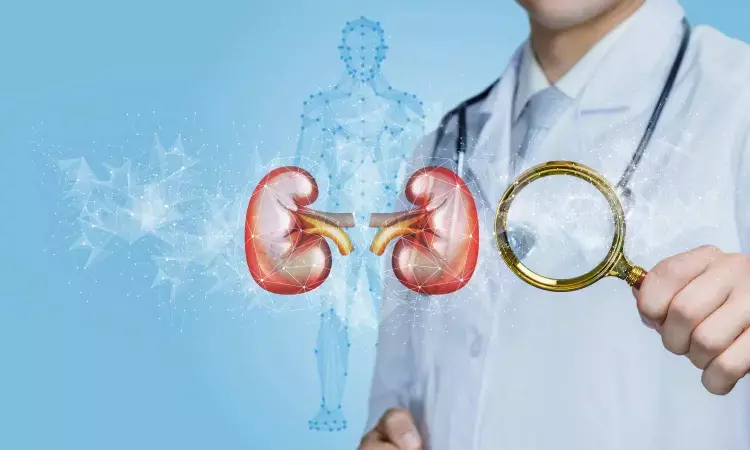- Home
- Medical news & Guidelines
- Anesthesiology
- Cardiology and CTVS
- Critical Care
- Dentistry
- Dermatology
- Diabetes and Endocrinology
- ENT
- Gastroenterology
- Medicine
- Nephrology
- Neurology
- Obstretics-Gynaecology
- Oncology
- Ophthalmology
- Orthopaedics
- Pediatrics-Neonatology
- Psychiatry
- Pulmonology
- Radiology
- Surgery
- Urology
- Laboratory Medicine
- Diet
- Nursing
- Paramedical
- Physiotherapy
- Health news
- Fact Check
- Bone Health Fact Check
- Brain Health Fact Check
- Cancer Related Fact Check
- Child Care Fact Check
- Dental and oral health fact check
- Diabetes and metabolic health fact check
- Diet and Nutrition Fact Check
- Eye and ENT Care Fact Check
- Fitness fact check
- Gut health fact check
- Heart health fact check
- Kidney health fact check
- Medical education fact check
- Men's health fact check
- Respiratory fact check
- Skin and hair care fact check
- Vaccine and Immunization fact check
- Women's health fact check
- AYUSH
- State News
- Andaman and Nicobar Islands
- Andhra Pradesh
- Arunachal Pradesh
- Assam
- Bihar
- Chandigarh
- Chattisgarh
- Dadra and Nagar Haveli
- Daman and Diu
- Delhi
- Goa
- Gujarat
- Haryana
- Himachal Pradesh
- Jammu & Kashmir
- Jharkhand
- Karnataka
- Kerala
- Ladakh
- Lakshadweep
- Madhya Pradesh
- Maharashtra
- Manipur
- Meghalaya
- Mizoram
- Nagaland
- Odisha
- Puducherry
- Punjab
- Rajasthan
- Sikkim
- Tamil Nadu
- Telangana
- Tripura
- Uttar Pradesh
- Uttrakhand
- West Bengal
- Medical Education
- Industry
Study Identifies FGF23 as an Early Biomarker for Diabetic Kidney Disease Risk

China: A recent prospective study has highlighted the role of fibroblast growth factor 23 (FGF23) as an early biomarker for predicting the onset of diabetic kidney disease (DKD).
The study, published in Diabetes, Obesity and Metabolism, revealed that serum fibroblast growth factor 23 levels may serve as an independent biomarker for early diabetic kidney disease (DKD) detection. Researchers observed that elevated FGF23 levels were linked to the progression of kidney disease and could improve the predictive accuracy of traditional screening.
Diabetic kidney disease, a common complication of diabetes, is a leading cause of chronic kidney disease and end-stage renal failure worldwide. Early detection and intervention are crucial in slowing disease progression and preventing severe outcomes. While traditional biomarkers such as albuminuria and estimated glomerular filtration rate (eGFR) are widely used for DKD diagnosis, they often detect kidney damage at a later stage. FGF23 is a bone-derived phosphaturic hormone involved in regulating mineral metabolism and the progression of chronic kidney disease. Identifying FGF23 as an independent predictor of DKD offers a promising avenue for earlier risk assessment and preventive strategies.
Against the above background, Weiping Jia, Shanghai Jiao Tong University, Shanghai, China, and colleagues aimed to explore the relationship between FGF23 and diabetic kidney disease in a community-based prospective cohort study.
For this purpose, the researchers analyzed data from 1,614 individuals with diabetes at baseline, selected from a cohort of 7,230 participants who completed a 4.6-year follow-up survey. Baseline serum FGF23 levels were assessed using an enzyme-linked immunosorbent assay. Multiple and ordinal logistic regression analyses were conducted to evaluate the predictive value of FGF23 for incident diabetic kidney disease.
The following were the key findings of the study:
- Baseline serum FGF23 levels showed an early increase in the course of diabetic kidney disease (DKD) and continued to rise with disease progression.
- There were no significant changes in serum calcium and phosphorus levels.
- Over a 4.6-year follow-up, 198 individuals with diabetes developed incident DKD.
- Elevated baseline FGF23 levels were significantly associated with an increased risk of developing DKD (odds ratio 1.290), even after adjusting for conventional DKD risk factors.
- The association between FGF23 and DKD was particularly strong in individuals with a lower body mass index (<24 kg/m²), poor glycemic control (HbA1c ≥7%), and a shorter duration of diabetes (<5 years).
- FGF23-based models demonstrated strong predictive performance for DKD risk and showed significant improvement over traditional DKD risk factor models.
The findings highlight a progressive increase in serum FGF23 levels during the early stages of diabetic kidney disease (DKD), establishing its significant association with the risk of incident DKD. The study suggests that FGF23 may be a reliable independent biomarker for predicting DKD risk and facilitating early identification of at-risk individuals.
'Additionally, the study underscores the potential clinical utility of FGF23 in improving DKD screening strategies. Further research is warranted to explore the causal mechanisms, underlying pathways, and clinical implications of FGF23 in DKD progression," the researchers concluded.
Reference:
Liu D, Yu S, Zhang Y, Li Q, Kang P, Wang L, Han R, Cheng D, Chen A, Hou X, Wu L, Zang S, Fang Q, Jia W, Li H. Fibroblast growth factor 23 predicts incident diabetic kidney disease: A 4.6-year prospective study. Diabetes Obes Metab. 2025 Feb 3. doi: 10.1111/dom.16224. Epub ahead of print. PMID: 39895483.
Dr Kamal Kant Kohli-MBBS, DTCD- a chest specialist with more than 30 years of practice and a flair for writing clinical articles, Dr Kamal Kant Kohli joined Medical Dialogues as a Chief Editor of Medical News. Besides writing articles, as an editor, he proofreads and verifies all the medical content published on Medical Dialogues including those coming from journals, studies,medical conferences,guidelines etc. Email: drkohli@medicaldialogues.in. Contact no. 011-43720751


